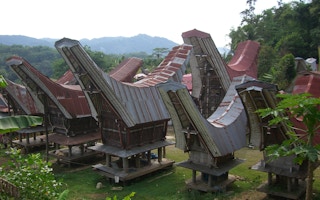In the Indigenous community where Rukka Sombolinggi grew up, on the Indonesian island of Sulawesi, strict rules governed how a slaughtered buffalo’s meat was divided.
The elderly, the sick and other vulnerable people received choice pieces - the head, the liver and the small intestine, considered a particular delicacy once roasted.
Others, better off, waited their turn for a share, risking condemnation from the community if they took too many of the best bits for themselves.
“People in powerful situations need to be controlled. If we don’t, the powerful will eat everything,” said Sombolinggi, now the general secretary of AMAN, an alliance that represents 15 million Indigenous people in Indonesia.
That message of managing the powerful - and keeping the communal good at the forefront of decisions - is one the world needs to learn from Indigenous people as it struggles to tackle big problems from climate change to pandemics, she said.
“We believe in the collective,” Sombolinggi said in an interview this week at the Skoll World Forum, an expert gathering focused on solving global problems.
“
The new narrative is ‘just transition’ - but it still exposes us to great threats. People in the Global North might feel better if they use electric cars. But it’s a new hell for us.
Rukka Sombolinggi, general secretary, Indigenous Peoples Alliance of the Archipelago
Particularly since the Covid-19 pandemic, “the global community, even people in cities, now realise that solidarity, reciprocity are very important - and that the global economic structure is failing us,” she said.
New land pressure
AMAN - the Indigenous Peoples Alliance of the Archipelago - got its start in 1999 and has since fought to secure Indigenous rights - and rights to 26 million hectares of Indigenous territory it has mapped across Indonesia, a country spread over about 17,000 islands.
This week it won a US$2.25 million (1.8 million pounds) prize for social innovation from the U.S.-based Skoll Foundation for its efforts.
But some of those have had limited success.
While AMAN has helped push a range of regulations to protect Indigenous rights, a broad draft Indigenous rights law has been awaiting approval for about a decade, according to Sombolinggi.
So far, only about 3 million hectares of Indigenous land have been recognised even at the local level, and just 100,000 hectares officially returned to Indigenous people as customary forest, she said.
That is considered a big problem as long-time threats to Indigenous land - such as expanding palm oil plantations - are joined by a host of new ones as companies and governments line up the minerals, clean energy installations and water storage dams needed to combat climate change and deal with its impacts.
Indonesia has the world’s largest reserves of nickel, for instance, used extensively in making batteries, and the country aims to become an electric vehicle powerhouse.
In just three years, Jakarta has signed deals worth about US$15 billion for battery and EV production. President Joko Widodo has banned nickel ore exports, saying he wants battery production to happen at homes to create jobs, a major priority for his government.
Indonesia is also building 57 new dams by 2024 to shore up irrigation for agriculture as climate change makes rains more unpredictable, as well as to reduce flood risk and provide a source of low-carbon hydroelectric power.
But all those projects take land - and local citizens, including Indigenous people, fear they will be the losers, Sombolinggi said.
As demand from investors grows, Indonesia’s government has set up a land bank of property available for development, and she worries that “without proper protections for our land, all of it could end up confiscated”.
A global shift to green energy is needed to combat climate change - but it is bringing serious costs, including for Indigenous people and nature, she said.
“The new narrative is ‘just transition’ - but it still exposes us to great threats,” the AMAN leader said.
“People in the Global North might feel better if they use electric cars. But it’s a new hell for us.”
Thriving communities
In other respects, however, Indonesia’s Indigenous communities are thriving.
Most prospered during the Covid-19 pandemic, remaining relatively healthy and growing enough food not only for themselves but to send to relatives in the cities.
The pandemic also brought many young Indigenous people back from cities to rural areas, and a doubling of Indigenous schools and the creation of more than 100 new community enterprises during the pandemic helped keep them there, Sombolinggi said.
Communities, for instance, are using philanthropic funding channelled through AMAN to build processing plants for products such as palm sugar, which can be sold for a profit.
The organisation over the last decade also has invested in mobile phones, internet service and other communications technology to link remote communities.
That has both made them more appealing to young people and better prepared to respond to threats, from illegal forest destruction and arrests of forest protectors to floods and landslides.
“We are traditional but we have embraced technology for our success,” Sombolinggi said.
She hopes other parts of the world will similarly adopt aspects of Indigenous culture - including a stronger sense of solidarity, empathy and reciprocity - to advance action on their own threats, including climate change.
“We need to really take on and learn from the collective experience of Indigenous people - and expand this into a global collective,” she added.
This story was published with permission from Thomson Reuters Foundation, the charitable arm of Thomson Reuters, that covers humanitarian news, climate change, resilience, women’s rights, trafficking and property rights. Visit https://www.context.news/.










